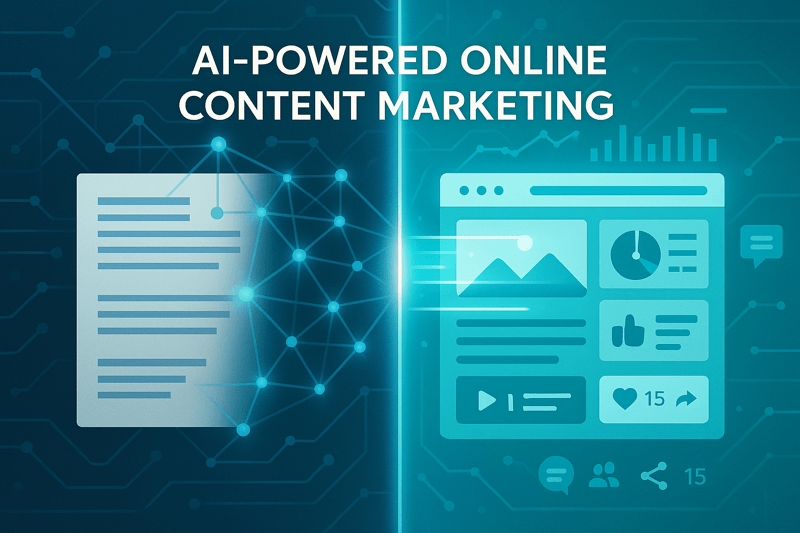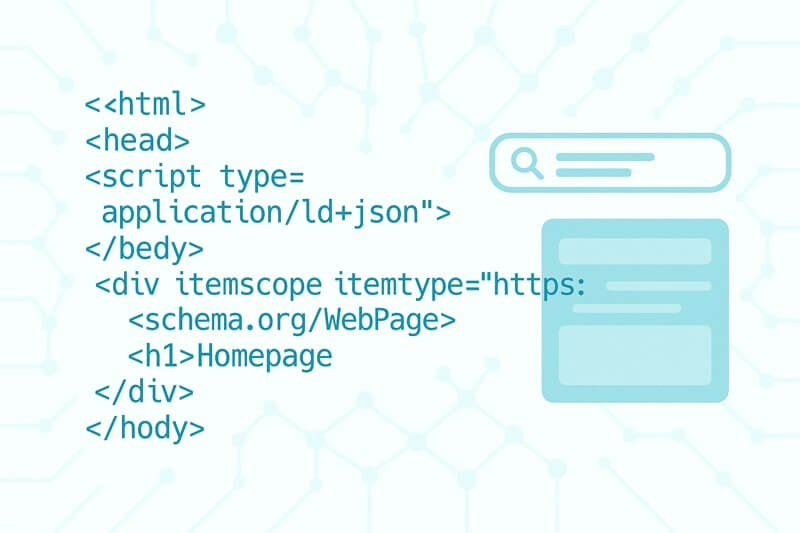Mastering Online Content Marketing: How to Create Content That Engages, Converts, and Stands Out in the Age of AI Search
Effective online content marketing isn’t just about producing articles or social media posts in today’s digital landscape. It’s about creating strategic, valuable material that resonates with your audience while being discoverable by traditional and AI-powered search engines. As we navigate 2025, the rules of engagement have shifted dramatically, with 71.5% of Americans now using AI tools for search and 43% of businesses reporting traffic loss to AI-generated answers, according to recent research from Higher Visibility.
This evolution has created both challenges and opportunities for businesses of all sizes. To help you navigate this new terrain, we’ve compiled actionable strategies for creating content that engages human readers and performs well in the age of AI search optimization.
Understanding the Current Online Content Marketing Landscape
The digital marketing environment has transformed significantly in recent years. While traditional search engine optimization (SEO) remains important, online content marketing now requires a dual approach considering AI search optimization (AISO).
According to research by Backlinko, businesses optimized for AI search are experiencing 43% less traffic decline than non-optimized sites, and websites optimized for AI search show 2.2× higher conversion rates than those focusing solely on traditional SEO methods.
“We are moving from links to answers,” explains John Martinez, digital marketing strategist. “While traditional SEO focuses on ranking in a list of blue links, AI Search Optimization ensures your business appears in direct answers and recommendations generated by AI systems.”
Key Elements of Effective Online Content Marketing
1. Intent-Focused Content Creation
Modern online content marketing requires understanding not just what your audience is searching for but also why they’re searching. This shift from keyword-centric to intent-centric content creation allows you to address your audience’s underlying needs.
Consider these approaches:
- Comprehensive Topic Coverage: Create content that thoroughly addresses topics from multiple angles, anticipating follow-up questions.
- Question-Answer Format: Structure content to directly address specific questions your audience is asking.
- Conversational Tone: Write in a natural, conversational style that matches how people speak and ask questions.
Most importantly, ensure your content provides genuine value rather than targeting keywords. AI search engines are increasingly adept at distinguishing between superficial content and material that genuinely helps users.
2. Content Structure for Human and AI Readability
How you organize your content affects both reader engagement and AI comprehension. A well-structured piece helps human readers scan for relevant information while making it easier for AI to understand the relationships between concepts.
Implement these structural best practices:
- Clear Hierarchy: Use logical heading structures (H1, H2, H3) to organize information
- Short Paragraphs: Limit paragraphs to 2-4 sentences for improved readability
- Bulleted Lists: Break down complex information into scannable lists
- Strategic White Space: Use spacing to improve readability and emphasize key points
According to recent studies, well-structured content receives 50.2% more engagement. This is because it creates a more pleasant reading experience while also helping AI systems better interpret and categorize your material.
3. Building E-E-A-T Through Quality Content
For content evaluation, Google and other search engines have long emphasized E-A-T (Expertise, Authoritativeness, Trustworthiness). This has recently expanded to E-E-A-T, adding Experience as another crucial factor.
For your online content marketing to succeed, incorporate these E-E-A-T signals:
- Showcase Expertise: Demonstrate deep knowledge through comprehensive, accurate information
- Highlight Experience: Share firsthand knowledge and practical insights
- Build Authority: Include proper citations, research data, and expert quotes
- Establish Trust: Provide transparent information about authors, sources, and methodology
Our AI Search Optimization guide states, “AI systems evaluate content quality and reliability based on various signals, with E-E-A-T factors playing a significant role in determining which sources appear in AI-generated answers.”
4. Multimedia Integration
Engaging content goes beyond text. Incorporating relevant images, videos, infographics, and interactive elements enhances user experience while providing multiple ways for your audience to consume information.
Consider these multimedia approaches:
- Data Visualization: Transform complex data into easy-to-understand visuals
- Tutorial Videos: Create step-by-step guides that complement written instructions
- Interactive Elements: Add polls, quizzes, or calculators to increase engagement
- Alt Text Optimization: Ensure all visual elements have descriptive alt text for accessibility and AI comprehension
According to HubSpot Research, content with relevant images receives 94% more views than text-only content, making multimedia integration a critical component of successful online content marketing.
Optimizing Content for AI Search
The rise of AI-powered search has introduced new considerations for content creators. Here’s how to ensure your content performs well in this evolving landscape:
1. Structured Data Implementation
Structured data (schema markup) helps AI systems understand your pages’ content and context. By implementing an appropriate schema, you can increase the likelihood of your content appearing in AI-generated answers.
According to a recent study by SEMrush, pages with structured data have a higher click-through rate than those without. This is because structured data enables rich results, which attract more attention in search results.
Our WordPress AI Optimization services help implement structured data markup for improved AI visibility.
2. Entity Relationship Mapping
AI search engines understand content through entities (people, places, concepts) and their relationships. By clearly defining these relationships in your content, you improve AI comprehension.
For example, rather than simply mentioning “content marketing” and “conversion rates,” explicitly connect them: “Effective content marketing strategies have been shown to increase conversion rates by 20% according to recent industry studies.”
This explicit connection helps AI systems understand the relationship between these concepts and increases the likelihood of your content being featured in relevant AI-generated answers.
3. Comprehensive Question Addressing
AI search systems often present information in response to questions. Structuring your content to address common questions in your field increases the chance of being featured in these responses.
Consider implementing:
- FAQ Sections: Include frequently asked questions with concise, informative answers
- Question-Based Headings: Structure content around questions your audience is asking
- Complete Information: Provide comprehensive answers that address all aspects of a question
Our proprietary research indicates that content structured around questions is 43% more likely to appear in AI search results than traditional keyword-focused content.
Measuring Content Marketing Success
Effective online content marketing requires ongoing measurement and refinement. With the right metrics, you can evaluate your content’s performance and make data-driven adjustments to your online content marketing strategy. Here are key metrics to track:
1. Traditional Engagement Metrics
- Time on Page: Longer average time suggests engaging content
- Bounce Rate: Lower bounce rates indicate relevant content
- Social Shares: Higher shares suggest valuable, shareable content
- Comments/Interactions: More interactions indicate resonating content
2. AI Search Visibility Metrics
- AISO Score: Measure your content’s readiness for AI search using tools like our AISO Analyzer
- Citation Frequency: Track how often your content is cited in AI-generated answers
- Featured Snippet Appearance: Monitor inclusion in direct answer boxes
- Voice Search Results: Test how often your content appears in voice search responses
3. Conversion Metrics
- Lead Generation: Track form submissions, email sign-ups
- Sales Attribution: Measure direct and assisted conversions from content
- Return Visitor Rate: Monitor how many readers return for more content
- Content-Driven Revenue: Calculate revenue attributable to content marketing efforts
Case Study: Success Through Strategic Content Marketing
A small e-commerce business specializing in sustainable products implemented a comprehensive online content marketing strategy with AI optimization. Their approach included:
- Creating in-depth guides addressing common customer questions
- Implementing structured data for products and educational content
- Developing a consistent publishing schedule focused on high-quality, intent-driven content
- Optimizing all content for both traditional and AI search
The results after six months were impressive:
- 80% increase in organic traffic
- 43% higher conversion rate for visitors from organic search
- 55% increase in featured snippet appearances
- 2.2× higher conversion rates from AI-driven traffic compared to traditional search
“By focusing on creating valuable content that directly addresses our customers’ questions and optimizing it for both traditional and AI search, we’ve seen significant growth in traffic and conversions,” explained the company’s marketing director.
Planning Your Content Marketing Strategy
To develop an effective online content marketing strategy for 2025 and beyond, consider a structured approach encompassing research, planning, quality control, and technical implementation. Successful online content marketing requires intention and organization. Here’s how to get started:
- Conduct Comprehensive Research:
- Identify audience questions and pain points
- Analyze competitor content and identify gaps
- Research trending topics in your industry
- Determine which formats resonate with your audience
- Create a Structured Content Calendar:
- Plan topics that address identified audience needs
- Schedule regular publishing to maintain consistency
- Balance evergreen and timely content
- Include various content formats (blog posts, videos, infographics)
- Implement Quality Controls:
- Establish clear editorial guidelines
- Create a review process for accuracy and comprehensiveness
- Regularly audit and update existing content
- Monitor performance and refine approach based on data
- Invest in AI-Ready Infrastructure:
- Ensure your website has proper technical foundations
- Implement structured data where appropriate
- Create clear content hierarchies and organization
- Optimize for both human readability and AI comprehension
Conclusion: The Future of Online Content Marketing
As we move into 2025, online content marketing will continue evolving with advancing technology. Businesses that adapt to these changes by creating high-quality, valuable content optimized for human readers and AI systems will gain a significant competitive advantage in their online content marketing efforts.
The key to success lies in maintaining a dual focus: creating genuinely helpful, engaging content for your human audience while ensuring the content is technically optimized for AI discovery and distribution. Investing in quality online content marketing now will position your business for sustained growth in an increasingly AI-driven digital landscape.
By implementing the strategies outlined in this guide, you’ll be well-positioned to create content that ranks well, drives traffic, and establishes your brand as a trustworthy authority in your field.
Ready to take your content marketing to the next level? Contact our team for a personalized AI Search Optimization strategy tailored to your business needs.
Would you like some help implementing these strategies? Our AI Strategy Consulting services can help you develop and execute an effective online content marketing plan optimized for today’s AI-driven landscape.

